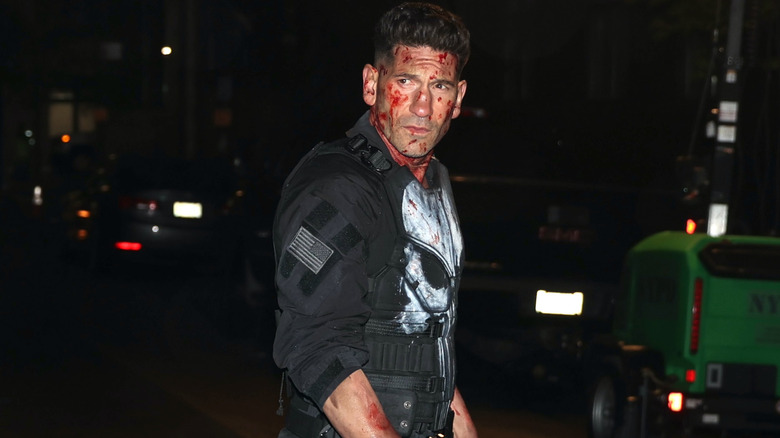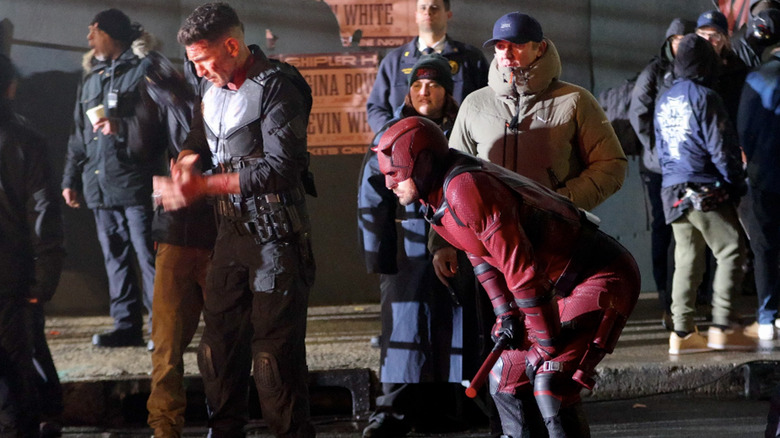Daredevil: Born Again Photos Confirm Jon Bernthal's Punisher Return With An MCU Upgrade
Over the past few months, there's been a lot of talk about which characters from the Marvel Netflix shows could reappear in the forthcoming "Daredevil: Born Again." Much of that anticipation has centered on the Punisher (Jon Bernthal), who provides a dark, violent foil to the kind of justice Daredevil (Charlie Cox) wants to dispense. Now, it's no longer a rumor that Jon Bernthal's Punisher will return to the Marvel Cinematic Universe, as set photos from "Born Again" show him in action, bloodied and with Daredevil by his side.
The photos have been uploaded to Getty and then reposted across social media, but it would seem Frank Castle doesn't waste any time laying down his version of justice. In most of the shots, his face is covered in blood, and he appears to be sporting an upgraded version of the skull-themed costume he dons in the Netflix universe. The question now is whose blood is on Punisher's face, because it sure doesn't look like it comes from him.
After a massive MCU overhaul, "Daredevil: Born Again" will bring back many of the original stars, including Foggy Nelson (Elden Henson) and Karen Page (Deborah Ann Woll). Such additions are bound to delight Marvel fans, and that excitement has likely only grown with the set photos confirming several rumored plot points from the show, namely how Kingpin (Vincent D'Onofrio) has organized an anti-vigilante task force, which probably explains why Daredevil and Punisher have to team up.
Daredevil and Punisher ... together again
Matt Murdock will have his work cut out for him, as one of the photos showcases some intriguing badges. The patch reads, "Anti-Vigilante Task Force New York City — Mayor Fisk." Given the history between Daredevil and Kingpin, it's safe to say the devil-themed vigilante will be within the task force's crosshairs. Punisher also falls into that camp, and the photos confirm a rumored plot detail that would explain Frank Castle's return. Police officers can be seen wearing the Punisher logo on their uniforms, which Frank probably won't be a fan of.
Several photos show Daredevil and Punisher side-by-side, with ol' Red having decidedly less blood on him than Frank. Maybe Punisher gets into some trouble before his ally shows up. In addition to all the photos, @SplashNews uploaded a video to X (formerly Twitter) showing the beginning of shooting a scene for "Daredevil: Born Again." Both actors cover their ears before the scene begins, and the noise of what sounds like glass shattering occurs. It's unclear what precisely is transpiring, but the fact Jon Bernthal and Charlie Cox are suited up in a Marvel project once again is more than enough to tide over fans for now.
"Daredevil: Born Again" resumed filming after a creative overhaul earlier this year and currently has no release date. While Bernthal's Punisher will officially be in the series, speculation continues to swirl over other Netflix Marvel characters who could be "born again," as it were. For example, Krysten Ritter's Instagram activity has fans wondering if she could come back as Jessica Jones. All such things will be revealed in due time.

